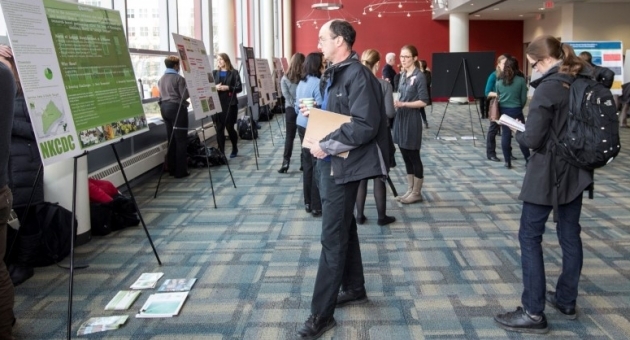Community nonprofits connect with academics for research

At Earth’s Keepers, a North Philadelphia–based nonprofit, Executive Director Alia Walker works with area youth to encourage urban gardening, improve food access and promote nutrition education.
She was also curious how the program could expand to include activities that foster physical activity and healthy lifestyles. Yet, like many nonprofits, Earth’s Keepers lacked the ability to conduct meaningful research to assess potential program effectiveness. Enter Community-Driven Research Day (CDRD), and a partnership with researchers and students at Temple University.
Finding a match
At CDRD, held this year at the Howard Gittis Student Center on Jan. 29, representatives from community-based organizations like Earth’s Keepers meet with researchers from local universities to discuss opportunities for collaboration.
“It’s like speed dating,” said Freda “Freddie” Patterson, CPH ’07, assistant professor in the College of Public Health. “You walk around and talk to the different people and find out their research questions and look for a good match.”
CDRD, which focuses on improving public health outcomes, has been running for five years.
“The basic idea is that it allows community organizations to set the priorities for research,” said Alice Hausman, chair of the Department of Public Health. “Often academics assume they know what’s best, but they don’t always understand what’s going on in the community.”
The program is preceded by Research Readiness Day, a half-day preparation workshop for interested organizations. This year’s Research Readiness Day included over 150 people and 25 local organizations. “We want to enable even the smallest grassroots organization to participate,” Hausman said.
A beautiful marriage
Once they make a successful match at CDRD, faculty members and students team up with organizations to develop a project proposal. A committee reviews the resulting proposals and awards pilot funds up to $10,000, provided by each of the institutions to selected research teams.
Temple is unique among the institutions in that its pilot funds stipulate the inclusion of undergraduates, and proposals must specifically denote students’ roles in the project.
Over the past year, Josh Mannings, Class of 2015, a social work major in the College of Public Health, has been conducting research on adult education as a vehicle for health literacy through Workforce Education and Lifelong Learning, one of Temple’s community partners.
“We certainly focus on research in our classes, but this opportunity allowed me to be involved with faculty research, and it put all of that classroom work into action,” Mannings said. “I now have the skills to conduct my own research.”
Funding and research questions can range in their scale and impact, but often CDRD projects help faculty and students leverage greater funding for future research. “The main goal is truly to foster that partnership and hopefully continue to work together,” Hausman said.
Freddy Patterson’s work with Earth’s Keepers is one example. The pilot-funded program, which first took place in 2012–2013, focused on improving lifestyles of women in Philadelphia’s Nicetown neighborhood through a line dancing class. Forty women danced twice a week for four months, increasing activity levels; the classes also focused on healthy eating.
“We had one master’s student who created her thesis from the project and five undergraduates who helped collect data. It was real-life research experience for them, which was invaluable,” said Patterson, who continues to work with the organization.
“For us, Community Driven Research Day is not just a day but a process,” said Walker. “That ongoing partnership has allowed us to bridge an area that wasn’t a strength of the organization and share our knowledge with the researchers, as well. The findings only benefit the community so it has been a win-win—a beautiful marriage.”
- Elisa Ludwig